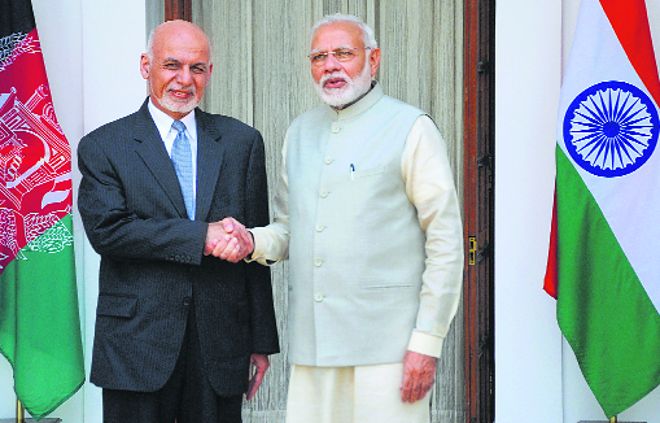
Show of support: PM Modi with President Ashraf Ghani. Short of putting boots on the ground, a lot can be done to boost intelligence and military capacities in Afghanistan.
Major Gen Ashok K Mehta (RETD)
Military commentator
THE brouhaha generated by the recent announcement during the NATO conference at Brussels by US Defence Secretary Mark Esper about the test run of a seven-day partial truce with the Taliban called Reduction in Violence (RiV) as a prelude to the political agreement is along expected lines. This drama has been in play with short intermissions to pull out 4,000 troops before November this year to facilitate President Trump’s re-election. In mid-December, Esper had said he would cut troop levels with or without an agreement and was backed by General Austin Miller, the military commander in Afghanistan. Aligned with this objective, Chairman, Joint Chiefs of Staff, General Mark Milley, told the US Congress that he was considering a leaner counter terrorism mission in Afghanistan. Trump has been threatening to withdraw troops from Afghanistan since 2018, but was held back by his security advisers and a posse of nine generals. On his first visit to Afghanistan on Thanksgiving Day last year, Trump told US soldiers that the Taliban want to make a deal — the same deal that he suddenly called off in September — talks which were resumed in December, on pause again in January, till revived this month.
The withdrawal agreement will lead to the intra-Afghan dialogue around March 10 to work out the political and constitutional future of Afghanistan. Germany and Norway have offered to host the first official dialogue between Kabul and the Taliban. The first lot of 4,000 US troops are expected to pull out in five months and if all goes well, the remaining 9,000 soldiers in 14 months. The future of US bases like Bagram and Kandahar on which the US has treaty arrangements with Kabul government for use till 2025 and beyond are not covered in the talks. The Taliban are unlikely to support retention of any bases. In the most recent Gallup poll in Afghanistan, a large majority of the people do not wish US troops to leave as they feel the Taliban will retard development and progress towards democracy.
Intriguing and unique to Afghanistan is the acronym RiV. In other peace processes, the terminology used is ceasefire, truce and cessation of hostilities. A significant reduction in violence is bound by a code of conduct for the Taliban fighters which includes halting use of improvised explosive devices, suicide bombings as well as rocket attacks. American commanders also wish to ascertain through RiV, the control and influence of the Taliban interlocuters led by Mullah Baradar over different factions of the Taliban — pro-talks and anti-talks — and the Haqqani network. In 2017, Taliban supreme leader Mullah Omar reneged on negotiations with the US and was taken out by a drone on the Pakistan-Iran borders on the orders of President Obama. In 2018, for the first time, Taliban declared a two-day Ramadan cease-fire across Afghanistan which was scrupulously observed and hugely welcomed by the ordinary Afghans. The RiV was reiterated at the Munich conference attended by Esper, Secretary of State Mike Pompeo and President Ashraf Ghani, who has been saying lately: “We can’t let outsiders decide our future.” The Afghanistan project is paid for by the US, EU and UN in that order.
Trump has often said that great nations do not fight endless wars and has considerable public backing for bringing back US soldiers from Afghanistan. In 2019, more than 20 soldiers were killed, though the US military no longer has any combat role in Afghanistan, where 2,400 US troops have lost their lives over the last 18 years. Trump has also wondered why the US, several thousand miles away, is embroiled in the war in Afghanistan when its neighbours like India and Pakistan are not. Between now and mid-March, RiV will be followed by a troop withdrawal pact, leading to the intra-Afghan dialogue and an interim political agreement between the Taliban and Kabul government which could lead to RiV/ceasefire, though this is unlikely as the Taliban use their military ascendency as the key bargaining chip.
Looking beyond the intra-Afghan dialogue, a package agreement between Kabul and the Taliban may open up other options — one involving a UN-mandated ceasefire backed by UN peacekeeping/peacebuilding forces. As a member of a regional contact group on Afghanistan, one interacted with UN officials in 2013-14 about a possible Chapter 7 role for UN peacekeepers in Afghanistan. Later, as part of the regional approach to bringing peace and stability to Afghanistan, the Shanghai Cooperation Organisation (SCO) stepping in to provide a regional peacekeeping force has also been considered. For years, the SCO summits have been recommending non-interference in Afghanistan. While India and Pakistan are full members of the SCO, Afghanistan and Iran enjoy observer status. Asia’s two principal powers, China and Russia, who have hosted the Afghan peace talks, are founder members of the SCO.
India has persisted in not engaging the Taliban despite the CDS, General Bipin Rawat, recommending it as Army Chief in 2018. Its line is that till Kabul opens talks with the Taliban, it is improper for India to do so. Historically, India has opposed reconciliation and integration of the Taliban, seen as a proxy of Pakistan, in Afghanistan’s political mainstream. At last month’s Raisina Dialogue, former President Hamid Karzai observed that India ‘appears not keen to support Afghanistan’s peace process.’ New Delhi’s failure to convert its economic heft and popularity into political influence has been attributed to lack of contiguity and Rawalpindi’s strategic assets and advantages. Short of putting boots on the ground — and these could be as blue helmets or under SCO — much more can be done to boost Afghanistan’s intelligence and military capacities.
It is possible that President Trump will have signed the political agreement with Taliban before he arrives in New Delhi. It will be a godsent opportunity for India to find a place in the intra-Afghan dialogue. PM Modi must use his considerable rapport with Trump for the purpose.
Join Whatsapp Channel of The Tribune for latest updates.




























